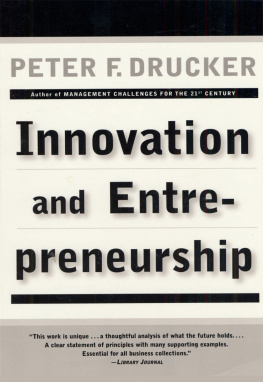Social Entrepreneurship
How Businesses Can Transform Society
Volume 1: The Nature of Organizational Structure in Social Entrepreneurship
Thomas S. Lyons, Editor

Copyright 2013 by ABC-CLIO, LLC
All rights reserved. No part of this publication may be reproduced, stored in a retrieval system, or transmitted, in any form or by any means, electronic, mechanical, photocopying, recording, or otherwise, except for the inclusion of brief quotations in a review, without prior permission in writing from the publisher.
Library of Congress Cataloging-in-Publication Data
Social entrepreneurship : how businesses can transform society / Thomas S. Lyons, editor.
v. cm.
Includes bibliographical references and index.
ISBN 978-0-313-39341-9 (hardcover : alk. paper) ISBN 978-0-313-39342-6 (ebook)
1. Social entrepreneurship. I. Lyons, Thomas S.
HD60.S5925 2013
658.408-dc23 2012031632
ISBN: 978-0-313-39341-9
EISBN: 978-0-313-39342-6
17 16 15 14 13 1 2 3 4 5
This book is also available on the World Wide Web as an eBook.
Visit www.abc-clio.com for details.
Praeger
An Imprint of ABC-CLIO, LLC
ABC-CLIO, LLC
130 Cremona Drive, P.O. Box 1911
Santa Barbara, California 93116-1911
This book is printed on acid-free paper 
Manufactured in the United States of America
Contents
Michael J. Caslin III with Marco Sachet and Elissa Shevinsky
Janelle A. Kerlin
Edmund R. Gray
John Casey
Sanjay Rupani and Laurel Ames Poolman
Brett R. Smith, Greg Van Kirk, and Joseph A. Kayne
Robert S. DIntino
Celine Chew
Mike Newton-Ward
Thomas S. Lyons
Preface
You have entered the first of three volumes on the relatively new and rapidly growing field of social entrepreneurship. The purpose of this set of books is to expose the reader to the latest thinking on this subject, with an emphasis on how social entrepreneurship and the organizations that engage in it actually work. With this purpose in mind, the writings presented are assembled according to three major themes. looks at the financing of social ventures: the major issues surrounding this subject, sources of financing, and financing strategy. The third volume takes on the very hot and highly related topics in social entrepreneurship of accountability, performance measurement, and performance management. It makes the case for the importance of these topics, identifies the accountability and performance pitfalls that social entrepreneurs face, discusses best practices in performance measurement, and makes the link between measurement and management.
These subjects are brought to life through the writings of 38 diverse chapter authors. These authors include scholars and practitioners of entrepreneurship and social entrepreneurship. They provide a global perspective, representing Australia, New Zealand, Switzerland, the United Kingdom, and the United States, and offer examples and case studies from around the world and from both developed and developing economies.
There are many definitions of social entrepreneurship and no consensus as to what it actually is. For the purposes of this set, I offer a simple definition of the term: the application of the mind-set, processes, tools, and techniques of business entrepreneurship to the pursuit of a social and/or environmental mission.
Although substantial information is imparted in these pages, this set of books does not purport to provide complete coverage of the subject. There is a rich and growing literature on social entrepreneurship that explores its many facets, including its theoretical underpinnings, the reasons individuals undertake it, its many manifestations, and how social entrepreneurs identify the opportunities they pursue, to name a few. The volumes in this set begin after the social entrepreneur has identified a social or environmental problem she wishes to solve, has determined that the identified problem presents a viable and sustainable opportunity to add value to society, and has committed to pursuing that opportunity. At this point, the entrepreneur can begin to think about the aspects of the social entrepreneurship process discussed hereinselecting an appropriate structure for the social venture that will be used to pursue her opportunity, finding financing for the effort, and ensuring that the social venture is performance based.
Interwoven throughout these volumes are chapters that examine the role of marketing in social entrepreneurship. This is a new aspect of the field and an important one. contains a chapter on market analysisarguably a tool for performance measurement and management.
Thus, the orientation of these volumes is practical. They are intended to help social entrepreneurs, prospective social entrepreneurs, and students of the field to better understand some of the essential issues and nuts and bolts of practice.
Thomas S. Lyons, Ph.D., Editor
Note
. See Jill Kickul and Thomas S. Lyons, Understanding Social Entrepreneurship: The Relentless Pursuit of Mission in an Ever-Changing World (New York: Routledge, 2012).
CHAPTER ONE
An Overview of Structural Options and Issues
Michael J. Caslin III
Marco Sachet
Elissa Shevinsky
When starting a social enterprise, ask yourself: What matters most to me, how will I make an impact, and what structure do I need to achieve it?
Welcome to the world of social entrepreneurship. You are entering an incredibly exciting sector that combines the power of entrepreneurial ingenuity and innovation with purpose-driven passion to achieve social transformation. Social enterprises exist in between the public and private sectors, operating in the middle ground where governments cant act and corporations either wont act or have tried to and failed. Social enterprises are subject to a unique set of mores, biases, challenges, laws, and practices.
Social enterprises vary greatly in form and function. They can take the form of a for-profit corporation, a nonprofit corporation or a nonprofit with a for-profit subsidiary (think National Geographic), or hybrid companies such as a for-profit company with a nonprofit subsidiary (think Newmans Own consumer food products and their Hole in the Wall Scholarship Camps for youth facing serious health challenges). For the organization to succeed, it must have a legal structure that supports appropriate cash flows to achieve sustainability. Revenue streams will likely include a combination of individual donations; foundation and corporate grants; impact investments/loans; federal, state, and city government grants or contracts; venture capital; venture philanthropy (seeking blended triple bottom line returns); and/or earned income. Although nonprofits have traditionally relied on donations, there is an increasing trend to diversify away from the exclusive reliance on grants to achieve a blended combination of philanthropic revenue and earned income. In so doing, more and more nonprofits are increasingly emulating for-profit companieshence, the convergence of form and function, structure and systems. At the same time, another force has arisen known as the Corporate Social Responsibility movement that in turn has fostered an increase in social missionoriented companies that are measured by a triple bottom line (TBL)benchmarked for profit, people, and planet achievements. In the space in between strictly for-profit and strictly nonprofit companies lies that exciting realm increasingly referred to as social enterprise.









